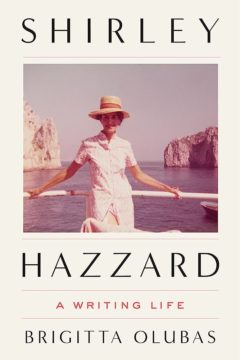David Mason at the Hudson Review:
 Among the literary genres, biography appears to be thriving. Perhaps it satisfies some element of life writing we also get from fiction, adding a dose of gossip and the illusion that we can actually know the truth of other people’s lives. There is always more than one way to tell a story. Some good recent biographies have been thematic or experimental: Katherine Rundell on John Donne, Frances Wilson on D. H. Lawrence, Andrew S. Curran on Diderot, Clare Carlisle on Kierkegaard. We have authoritative doorstoppers from Langdon Hammer on James Merrill to Heather Clark’s numbingly detailed book on Sylvia Plath. And we find a happy medium-sized biography in Mark Eisner’s on Neruda or Ann-Marie Priest’s on the great Australian poet Gwen Harwood. Among the best of these, Brigitta Olubas’ Shirley Hazzard: A Writing Life is not overstuffed or particularly arcane in structure, not weighted down with newly discovered scandal, but lucidly and even gracefully organized, guided by a compelling thesis.[1] Olubas believes, and I agree, that Hazzard pursued one erotic object more than all others, poetry, which is inseparable from Eros in its other meanings. “This . . . large belief in romantic and sexual love stands behind all Shirley Hazzard’s writing,” Olubas tells us. “It is aligned with her sense of human connectedness and above all with poetry, which is at heart for her a way of being human.”
Among the literary genres, biography appears to be thriving. Perhaps it satisfies some element of life writing we also get from fiction, adding a dose of gossip and the illusion that we can actually know the truth of other people’s lives. There is always more than one way to tell a story. Some good recent biographies have been thematic or experimental: Katherine Rundell on John Donne, Frances Wilson on D. H. Lawrence, Andrew S. Curran on Diderot, Clare Carlisle on Kierkegaard. We have authoritative doorstoppers from Langdon Hammer on James Merrill to Heather Clark’s numbingly detailed book on Sylvia Plath. And we find a happy medium-sized biography in Mark Eisner’s on Neruda or Ann-Marie Priest’s on the great Australian poet Gwen Harwood. Among the best of these, Brigitta Olubas’ Shirley Hazzard: A Writing Life is not overstuffed or particularly arcane in structure, not weighted down with newly discovered scandal, but lucidly and even gracefully organized, guided by a compelling thesis.[1] Olubas believes, and I agree, that Hazzard pursued one erotic object more than all others, poetry, which is inseparable from Eros in its other meanings. “This . . . large belief in romantic and sexual love stands behind all Shirley Hazzard’s writing,” Olubas tells us. “It is aligned with her sense of human connectedness and above all with poetry, which is at heart for her a way of being human.”
more here.
